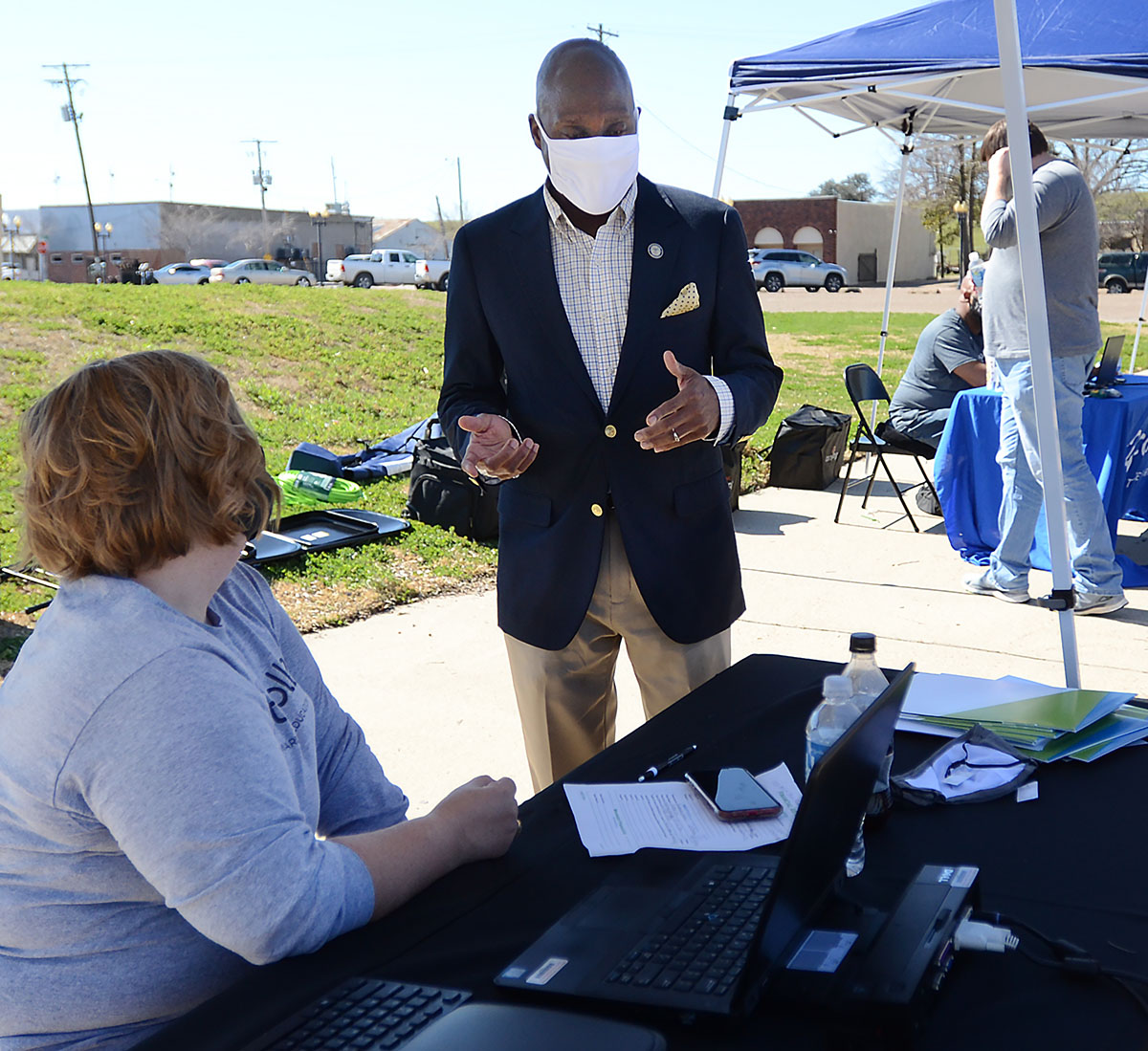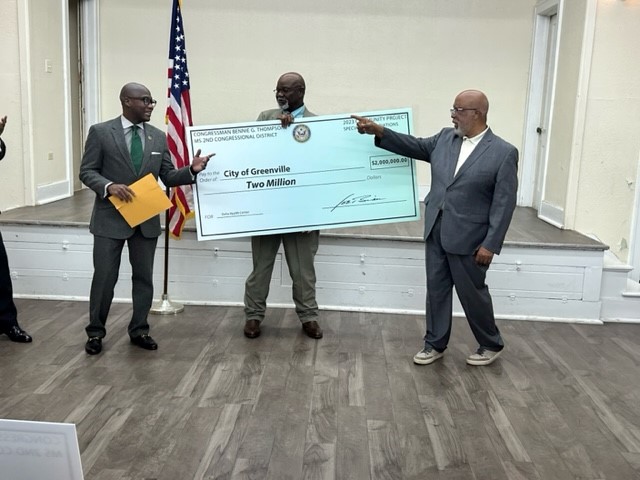Mississippi Today
Feds give Greenville grant for primary care clinic as Delta faces loss of health care services

Feds give Greenville grant for primary care clinic as Delta faces loss of health care services
Local leadership in the Delta says the region's crumbling health system has been abandoned by the state – so they're figuring out how to fix it on their own with the help of federal funds.
Greenville's mayor and a local health clinic say they're working to give people in the Delta better access to doctors and primary care, as hospitals around them shutter and strip back specialty care. As a result, the city of Greenville received $2 million in federal funds to construct a new health clinic in partnership with the Delta Health Center.
“This is a bottom-up action in response to the state's failure to act,” said Greenville Mayor Errick Simmons. “We went straight to the solution, and we will continue to do these types of projects to make sure our folks get the health care they need.”
Simmons accepted a symbolic check from U.S. Congressman Bennie Thompson who helped secure the funds from a House spending bill earmarked for community projects during a Tuesday press conference. Thompson announced close to $18.8 million in federal funds for his district, which covers much of Western Mississippi.
“A lot of you have heard of the trouble that health care is having in the Delta,” Thompson said during the press conference. “Our governor, for some reason, doesn't want to help.”
Thompson was referring to Gov. Tate Reeve's firm stance against Medicaid expansion, despite a mounting statewide hospital crisis. New data from mid-January shows that 38% of Mississippi hospitals are at risk of closing. Of the 28 rural hospitals at risk of closing, 19 are at risk of shuttering immediately.

Mississippi news — direct to your inbox.
Reeves' office did not immediately respond to a request for comment from Mississippi Today.
Greenwood Leflore Hospital recently shuttered its labor and delivery unit, primary care clinic and reduced other services. Delta Health-The Medical Center in Greenville also closed its neonatal intensive care unit and cardiac rehabilitation department last year.
Simmons said he applied for the grant last year because he feared the Delta would continue to lose access to doctors. Already, he said, there is only one pediatrician for every 4,000 children in the region.
He hopes other cities may copy his approach to help fund sorely needed primary care options to lessen the burden on the hospital system, which continues to struggle against massive staffing shortages.
“I think the Biden-Harris administration has a wealth of opportunities to begin grabbing pockets of money, working from local government to federal government, providing better access to quality health care to the folks that deeply need it,” Simmons said.
Delta Health Center CEO John Fairman said the new facility is projected to cost about $10 million to construct. He said he is in conversations with other funding sources and hopes to break ground on the new building before the end of the year.
The vision is for the clinic to better make use of telehealth options to connect rural residents who may not have internet access in their homes with specialists virtually. A nurse or a physician assistant would be in the room in person, too, helping facilitate care.
“Then they can make an assessment for intervention and as to whether or not they need to arrange transport to get to a specialist (in person),” Fairman said. “Once we get a better understanding of the data, we can have a specialist where the most acute cases are (scheduled weekly in person).”
The new clinic would also have a pharmacy open until 11 p.m. – most Delta pharmacies close at 6 p.m.
Fairman said the future of health care in the Delta needs to be collaborative, and he's already in discussion with county hospitals on how to better partner. The Delta continues to be among the unhealthiest parts of the state with high percentages of uninsured residents. Fairman and Simmons want better health care intervention to prevent hospital visits.
“We need other ways to offer care after hours so people are not crowding up the emergency room, and we're preserving trauma centers and emergency rooms for the people who really need that,” Fairman said.
Medicaid expansion would mean between 200,000 and 300,000 more Mississippians would have access to health insurance and hospitals would have an easier time being reimbursed for care rendered. More than 15 state bills that would have expanded Medicaid to provide coverage to the working poor died earlier this month without any debate or vote in the House or Senate.
“Had Mississppi accepted the expansion nine years ago, they would have accrued about $14 billion dollars that would go toward health care,” Thompson said. “But somehow they think people don't need that.”
Simmons has little faith in the state stepping up to support what his community needs. He hopes more mayors are emboldened to think creatively.
“An unhealthy child cannot go to school to learn; an unhealthy adult cannot work,” Simmons said. “This is a way for us to begin addressing an epic state failure.”
This article first appeared on Mississippi Today and is republished here under a Creative Commons license.
Mississippi Today
Podcast: The contentious final days of the 2024 legislative session

Mississippi Today's Adam Ganucheau, Bobby Harrison and Geoff Pender break down the final negotiations of the 2024 legislative session's three major issues: Medicaid expansion, education funding, and retirement system reform.
This article first appeared on Mississippi Today and is republished here under a Creative Commons license.
Did you miss our previous article…
https://www.biloxinewsevents.com/?p=353661
Mississippi Today
Lawmakers negotiate Medicaid expansion behind closed doors, hit impasse on state budget
House and Senate Republicans continued to haggle over Medicaid expansion proposals Sunday, and the state budget process hit a snag after leaders couldn't reach final agreements by a Saturday night deadline on how to spend $7 billion.
House Speaker Jason White on Sunday told his chamber that Medicaid expansion negotiators from the House and Senate had been meeting and he expected a compromise “will be filed by Monday or Tuesday at the latest.”
House Medicaid Chairwoman Missy McGee said the Senate had delivered another counter proposal on expansion Sunday evening but declined to provide details. Her Senate counterpart, Medicaid Chairman Kevin Blackwell, declined comment on Sunday. The two leaders met in McGee's office on Sunday evening following a Saturday afternoon meeting.
READ MORE: House, Senate close in on Medicaid expansion agreement
Lawmakers have for the past couple of months been debating on how to expand Medicaid coverage for poor Mississippians and help the state's flagging hospitals. The House initially voted to expand coverage to an estimated 200,000 people, and accept more that $1 billion a year in federal dollars to cover the cost, as most other states have done. The Senate initially passed a far more austere plan, that would cover about 40,000 people, and would decline the extra federal money to cover costs.
Since those plans passed, each has offered counter proposals, but no deal has been reached.
A group of about 50 clergy, physicians and other citizens who support full expansion showed up at the Capitol on Sunday to sit in the Senate gallery and deliver letters to key leaders who are negotiating a final plan.
“When we stand before the Lord, he's not going to ask how much money did you save the state. He's going to ask you what you did for the least of these,” Monsignor Elvin Sounds, a retired Catholic priest, said outside the Senate gallery on Sunday.
READ MORE: A solution to the Republican impasse on Medicaid expansion
Lawmakers hit an impasse on setting a $7 billion state budget and missed Saturday night's deadline for filing appropriations bills. This will force the legislature into extra innings, and require lawmakers to vote to push back deadlines. Lawmakers had expected to end this year's session and leave Jackson by early this week. But House Speaker Jason White told his chamber on Sunday they should expect to continue working through Friday, “and possibly through Saturday or Sunday.
White later said of the budget impasse, “When you get to haggling over spending $7 billion, folks are going to have disagreements.”
Lt. Gov. Delbert Hosemann, who presides over the Senate, said “things are fluid. But everybody is working.”
He looked at his watch and said “It is 5 o'clock. By 6 o'clock what I tell you will have changed.”
White said one reason for the session having to run extra innings is that when he became speaker he vowed to House members that he would not continue the practice of passing much of the state budget last-minute, late at night or in the wee hours of the morning with little or no time for lawmakers to read or vet what they are passing.
He said the House was prepared early Saturday night to file budget bills with agreed-upon numbers, but not to file “dummy bills” with zeros or blanks and continue haggling a budget late into the night.
“I made a promise that we are not going to keep them up here until midnight, then plow through all these budget bills,” White said. “We had had a gentleman's agreement (between the House and Senate) earlier in the session to negotiate a budget by April 15. That didn't happen … We are not going to do everything last minute with no time for our members to read things and ask questions. We are not going to do it in the middle of the night.”
READ MORE: Senate negotiators a no-show for second meeting with House on Medicaid expansion
This article first appeared on Mississippi Today and is republished here under a Creative Commons license.
Mississippi Today
On this day in 1951


April 28, 1951

Ruby Hurley opened the first permanent office of the NAACP in the South.
Her introduction to civil rights activism began when she helped organize Marian Anderson's 1939 concert at the Lincoln Memorial. Four years later, she became national youth secretary for the NAACP. In 1951, she opened the organization's office in Birmingham to grow memberships in Alabama, Florida, Georgia, Mississippi and Tennessee.
When she arrived in Mississippi, there were only 800 NAACP members. After the governor made remarks she disagreed with, she wrote a letter to the editor that was published in a Mississippi newspaper. After that step in courage, membership grew to 4,000.
“They were surprised and glad to find someone to challenge the governor,” she told the Chicago Defender. “No Negro had ever challenged the governor before.”
She helped Medgar Evers investigate the 1955 murder of Emmett Till and other violence against Black Americans. Despite threats, she pushed on.
“When you're in the middle of these situations, there's no room for fear,” she said. “If you have fear in your heart or mind, you can't do a good job.”
After an all-white jury acquitted Till's killers, she appeared on the front cover of Jet magazine with the headline, “Most Militant Negro Woman in the South.”
Months later, she helped Autherine Lucy become the first Black student at the University of Alabama.
For her work, she received many threats, including a bombing attempt on her home. She opened an NAACP office in Atlanta, where she served as a mentor for civil rights leader Vernon Jordan, with whom she worked extensively and who went on to serve as an adviser to President Bill Clinton.
After learning of Evers' assassination in 1963, she became overwhelmed with sorrow. “I cried for three hours,” she said. “I shall always remember that pool of blood in which he lay and that spattered blood over the car where he tried to drag himself into the house.”
She died two years after retiring from the NAACP in 1978, and the U.S. Post Office recognized her work in the Civil Rights Pioneers stamp series. In 2022, she was portrayed in the ABC miniseries, “Women of the Movement.”
This article first appeared on Mississippi Today and is republished here under a Creative Commons license.
-
Local News4 days ago
Sister of Mississippi man who died after police pulled him from car rejects lawsuit settlement
-
Mississippi Today4 days ago
At Lake High School in Scott County, the Un-Team will never be forgotten
-
Mississippi Today1 day ago
On this day in 1951
-
Mississippi News2 days ago
One injured in Mississippi officer-involved shooting after chase
-
Mississippi News7 days ago
Cicadas expected to takeover north Mississippi counties soon
-
Mississippi News6 days ago
Viewers make allegations against Hatley teacher, school district releases statement – Home – WCBI TV
-
Mississippi News Video5 days ago
Vehicle struck and killed man lying in the road, Alcorn County sheriff says
-
Mississippi Today7 days ago
On this day in 1892







































